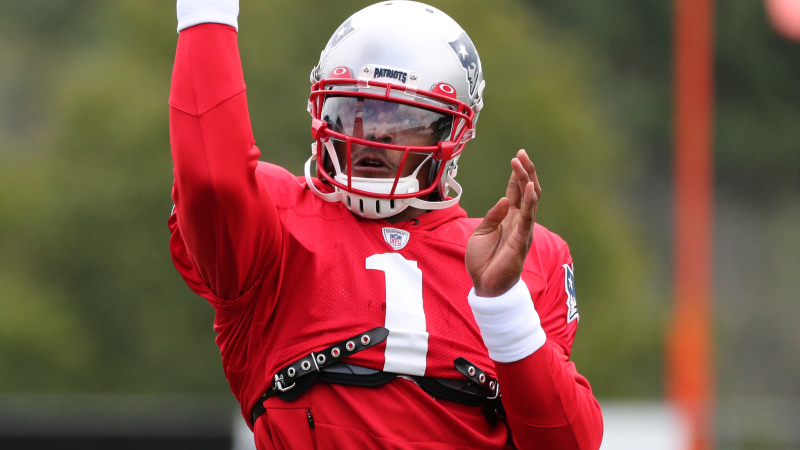JC Jackson is one of the NFL’s premier cornerbacks, though you certainly wouldn’t know it based on how the New England Patriots manage the third-year pro.
Jackson, who came into the league as an undrafted free agent out of Maryland in 2018, has actually led qualified cornerbacks in passer rating allowed in each of his first two NFL seasons, according to Pro Football Focus’ tracking. Yet, Jackson has only started 11 games in that span, and he entered training camp still competing with Jason McCourty and Jonathan Jones for playing time behind Stephon Gilmore on the Patriots’ cornerback depth chart.
“Each year is different,” Jackson said Monday in a video conference call. “No matter what the stats say from last season, each season you’ve got to prove yourself. You’ve got to earn a roster -- like Bill (Belichick) says, ‘you’ve got to earn here. And I won't give you anything.’ So, my stats from last year don't mean anything. I just come to work with my head down, and I just come in ready to work and get better.”
Jackson played 67.6 percent of defensive snaps for the Patriots last season and allowed 31 catches on 63 targets for 328 yards with one touchdown and five interceptions for a 37 passer rating allowed. As a rookie, Jackson played 46.8 percent of defensive snaps and let up just 22 catches on 42 targets for 262 yards with no touchdowns and three interceptions for a 42 passer rating allowed.
Jackson said the requirement to earn a role and spot on the team “absolutely” motivates him.
It’s still a curious approach the Patriots are taking with Jackson, but there’s certainly some method to the madness. Jackson is a supremely confident player. When it was pointed out to him that Next Gen Stats ranked him as the NFL’s second-best coverage player (behind teammate Stephon Gilmore) in 2019, Jackson said he wasn’t surprised.
“I know what I can do,” Jackson said. “It is what it is, I guess. They just started to realize it, but I’ve been knowing what I can do to help this team.”
Patriots head coach Bill Belichick revealed Monday that Jackson has expanded his role this season. While Jackson has primarily played outside cornerback in his first two seasons, that could mean more time spent in the slot this year.
“I think his understanding of the defense and his ability to play different spots within the defense has grown, and that gives us some flexibility on a number of levels,” Belichick said. “He’s had a good camp, been out there every day, he’s taken a lot of reps, he’s in good condition, his techniques and fundamentals are pretty good. So, he continues to make plays for us on the field and expand the things that he can do to provide, as I said, more versatility and for him to create either bigger or sometimes different roles for himself or for his teammates.”
Jackson, who’s nearly impossible to beat deep, scoffed at the idea that he couldn’t handle shorter routes, as well.
“Yeah, I can cover anything, man, like getting out on an island,” Jackson said. “Intermediate routes, deep balls, I just got a lot more deep balls last year and in my first year, and I just took advantage of my opportunities when it came my way. But I can cover anything.”
Jackson went undrafted out of Maryland over character concerns. Because he was added as a UDFA, Jackson is in the final year of his three-year rookie contract. If the Patriots don’t sign Jackson to a contract extension before next offseason, he would become a restricted free agent in 2021. That means the Patriots could offer him an original-, second- or first-round tender, which come at varying and increasing costs. If the Patriots offer Jackson a first-round tender, for example, another team could then sign him to a contract offer sheet. If the Patriots matched that offer sheet, then they would sign him to that proposed contract. If the Patriots declined to match the offer sheet, then they would receive a first-round pick as compensation from the offering team. If Jackson doesn't get signed to an offer sheet, then the Patriots would keep him under contract for one year at the cost of the tender.
So, the Patriots will either sign Jackson long term, get an early-round pick in exchange for him or retain the young cornerback on an inexpensive one-year contract.
By limiting Jackson’s starts and snaps and requiring him to earn his role on the team, the Patriots are ensuring that Jackson doesn’t get overconfident and limits his value once he becomes a restricted free agent. And the market would dictate Jackson’s value once he hits restricted free agency since it’s up to other teams to sign him to an offer sheet.
Opposing teams might be on to the Patriots’ methods, but still, they might pause before offering Jackson a five-year, $82.5 million contract in line with the one Byron Jones signed with the Miami Dolphins this offseason if he can’t even consistently beat out McCourty or Jones for snaps. Jackson also will become a restricted free agent when teams’ spending will be reduced by a lowered salary cap.
To put it simply, the Patriots would be wise to wait to sign Jackson long term rather than getting out ahead of it this offseason.
Any other player around the league with Jackson’s resume would be a shoo-in starter on his respective team. But the Patriots’ depth at cornerback allows them to handle Jackson differently, and it could wind up paying off next offseason if they can get him at a reduced cost.





